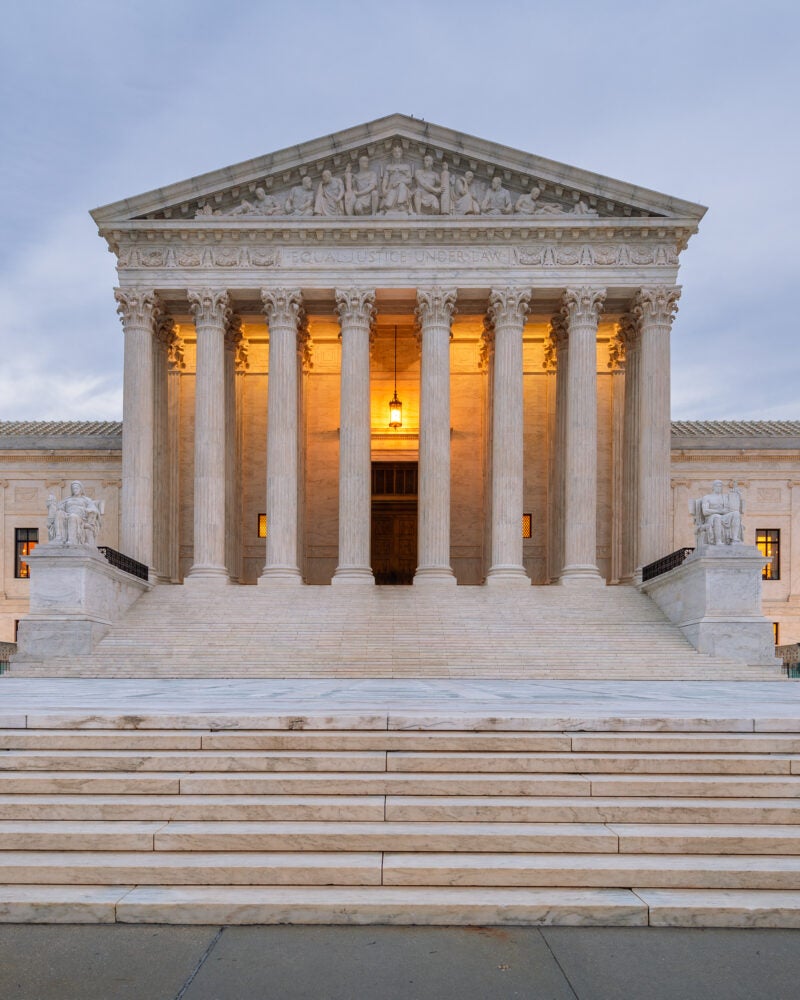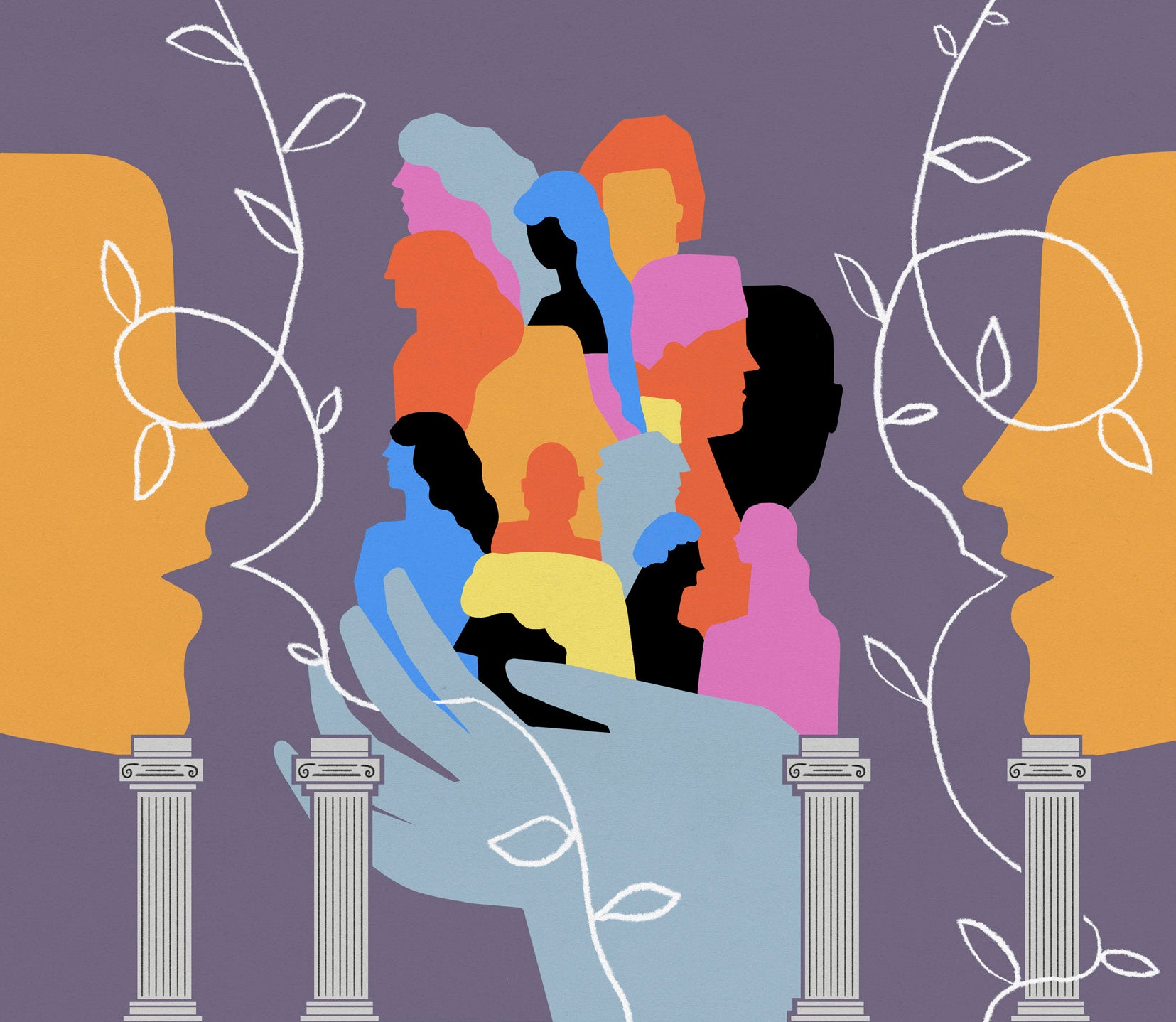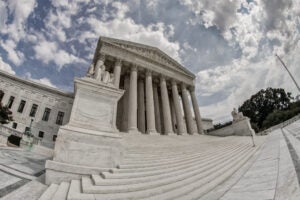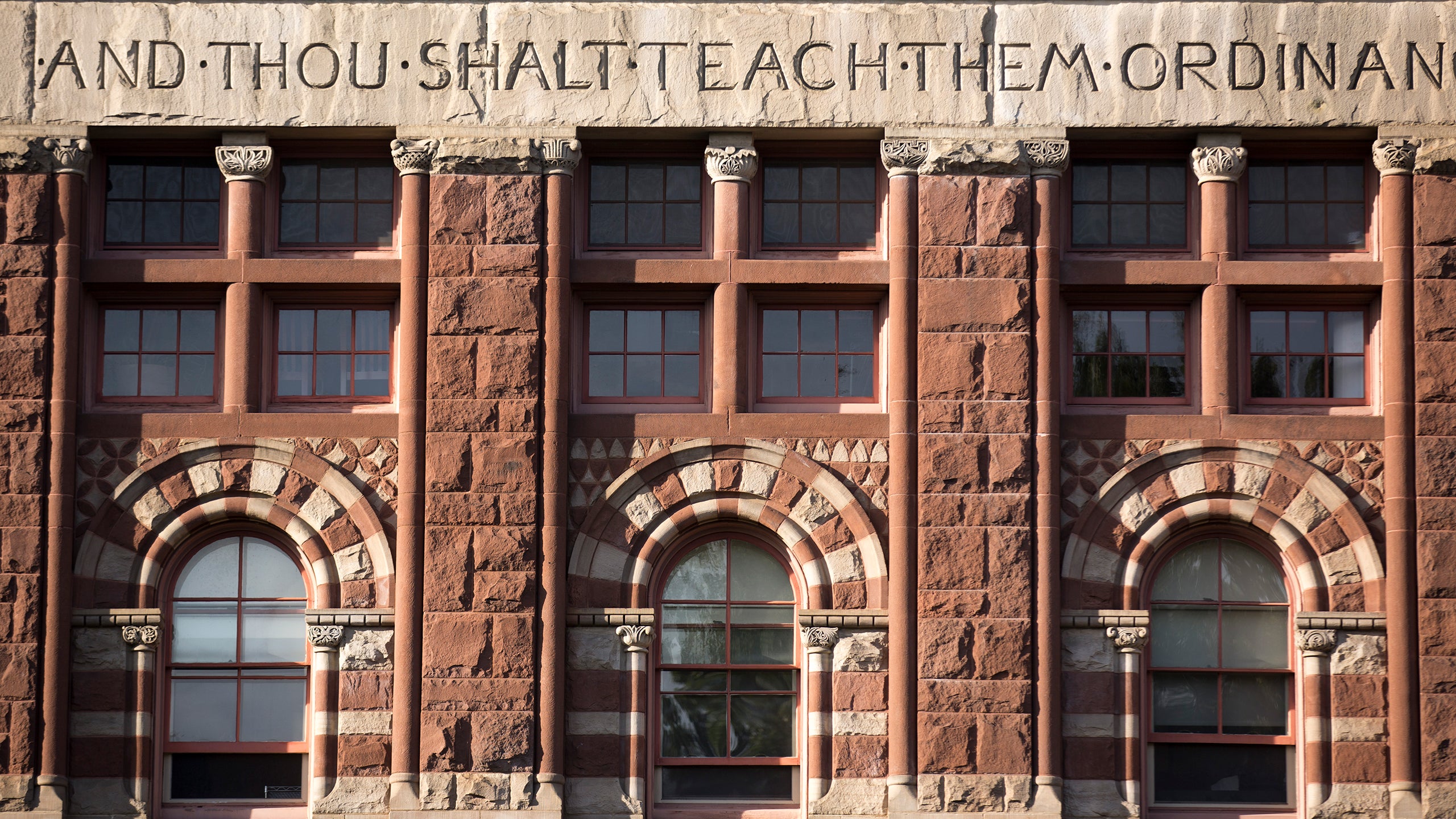People
Adrian Vermeule
-
A Blast from the Past
July 15, 2022
Adrian Vermeule proposes an approach to constitutional interpretation rooted in classical legal tradition
-
Harvard Law School experts weigh in on the Supreme Court’s final decisions.
-
What Common Good?
April 7, 2022
Just as the Supreme Court is poised to achieve many of the stated aims of the conservative legal movement, including overturning Roe v. Wade and striking down affirmative action, leading conservative thinkers are hotly debating alternative approaches to interpreting the Constitution. Originalism—the notion that the words of the Constitution should be read according to some version of their original historical meaning—has been the standard-bearer for decades, promoted initially as a strategy to undermine national economic regulation and limit the protection of civil rights. But a conservative competitor to originalism has recently emerged in “common good constitutionalism.” For its leading proponent, Adrian Vermeule, a Harvard law professor, the point of constitutional interpretation isn’t to discern what the Founders thought or what some legal text meant to ordinary readers when it was enacted. Instead, the aim is to promote the “common good.” Vermeule claims that within the “classical legal tradition”—which extended from the Roman Empire through early modern Europe—political officials, including judges, understood that the purpose of the state is to secure the goods of “peace, justice, and abundance,” which he translates now into “health, safety, and economic security.” But in Vermeule’s telling, American conservatives have lost sight of that tradition and its influence on our own legal system. They have been blinded by originalism, which has become a stultifying obstacle to promoting a “robust, substantively conservative approach.
-
An Extraordinary Account of a Hasidic Enclave
February 24, 2022
In an old joke, a secular Jew sits down on a park bench next to a man with a large black hat and a long black coat. The secular Jew turns to the darkly garbed man and says, “What’s the matter with you Hasids? This isn’t the Old Country—it’s the modern world. You people are an embarrassment to the rest of us.” The man turns around and says, “Hasid? I’m Amish.” The secular Jew immediately replies, “It’s so wonderful the way you’ve held on to your traditions!” ... They will be regarded as ‘options’ within the liberal frame, and while suspect in the broader culture, largely permitted to exist so long as they are nonthreatening to the liberal order’s main business.” [Adrian] Vermeule, a conservative scholar at Harvard Law School, agrees with Deneen’s assessment but considers his prescription altogether too quietist, proposing instead the cultivation of clandestine agents who might “come to occupy the commanding heights of the administrative state,” where they “may have a great deal of discretion to further human dignity and the common good, defined entirely in substantive rather than procedural-technical terms.” (One can’t help but think of jurists like Amy Coney Barrett.) Brooks, a commentator, has fewer qualms about liberalism per se, and thinks the focus ought to be on the renewal of a culture of civic righteousness.
-
Supreme Court Justices Have Forgotten What the Law Is For
February 4, 2022
An op-ed by Adrian Vermeule: Justice Stephen Breyer last week announced that he will retire at the end of this Supreme Court term. If the recent past is any guide, whoever is nominated to replace him will face a barrage of attacks from political opponents. Every Supreme Court nomination is now a battleground, featuring slander and even angry demonstrations, as when protesters of Justice Brett Kavanaugh’s nomination invaded the Senate building and attacked the very doors of the court.
-
Supreme Court Justice Stephen Breyer’s legacy in administrative law
January 31, 2022
Justice Stephen Breyer's decision to retire from the Supreme Court has led to the usual frenzy over who his replacement might be. But it's also worth noting how he shaped important areas of the law - one of them, administrative law. Now, that might sound like a boring, dry topic, but it actually really matters. Administrative agencies like the Environmental Protection Agency or the Centers for Disease Control play an important role in determining policy in key areas of life, like how much of a certain chemical is safe enough to have in drinking water or implementing vaccine requirements. ... For that, we've called Adrian Vermeule. He is a constitutional law professor at Harvard University School of Law, and he is one of the co-authors of the book "Administrative Law And Regulatory Policy," along with Justice Breyer, and he is with us now. Professor Vermeule, welcome. Thank you so much for joining us.
-
Can Catholic Social Teaching Unite a Divided America?
February 8, 2021
President Joe Biden, the second Catholic in history to hold the office, has made religion a prominent element of his public role. He attended Mass on the morning of his inauguration, quoted the theologian and philosopher St. Augustine in his inaugural speech and placed a photograph of Pope Francis, whom he has praised as a personal inspiration, behind his desk in the Oval Office...Perhaps inevitably, the start of the Biden administration has kicked off a debate over how Catholic his policies actually are... “In a society with very few strong moral paradigms left, Catholic social thought is a well-organized tradition that has something for both left and right,” said Adrian Vermeule, a conservative professor of constitutional law at Harvard University. “Catholicism, despite or because of our polarized age, is becoming something like an organizing common language for a great deal of American public life.”
-
On the bookshelf
December 15, 2020
In the unusual year of 2020, Harvard Law authors continued to do what they always have: Write.
-
An op-ed by Gladden Pappin and Adrian Vermeule: It’s the last full week of presidential campaigning, so Americans might be excused for having missed news that the Vatican renewed its preliminary agreement with China over the appointment of bishops. The agreement has drawn the ire of many American conservatives, not least Secretary of State Mike Pompeo, who charges that a compromise with Beijing erodes Rome’s moral witness. Pompeo’s concerns deserve to be taken seriously. They reflect not only the view of the Trump administration, but that of many Catholics, including Cardinal Joseph Zen, the former bishop of Hong Kong, and other senior churchmen. There is no denying that in Beijing, Rome faces an authoritarian regime that has persecuted people of faith, Catholics especially, from its founding. Yet Americans should also consider what the church sees when she looks to China with eyes ultimately fixed on transcendent, theological horizons. The key here is that the agreement is sharply limited in scope. It primarily addresses the appointment of bishops, the very composition of the church herself. For the church, what matters above all is the mystical embodiment of Christ in the structure of pope, bishops and laity. By giving priority to the question of bishops in the preliminary agreement, the Holy See merely follows the proper sequence of events from the church’s standpoint: First, the lines of authority have to be made clear; then, in subsequent talks, other aspects of the relationship may be clarified. Critics go wrong assuming the agreement is some sort of general charter governing relations between Beijing and the Roman church. The agreement isn’t a concordat. A concordat involves the establishment of official diplomatic relations. The Holy See, which still recognizes Taiwan, is the most important sovereign entity not to have diplomatic relations with China, and that remains true under this agreement.
-
Books in Brief: Fall 2020
October 20, 2020
New works on redeeming the administrative state, navigating parenting in a world in which children are immersed in technology, and understanding the importance of understanding how much information you need.
-
‘Law & Leviathan’ Review: Self-Government Minus the Self
September 24, 2020
The U.S. Constitution’s separation of powers is a concession to man’s fallibility. Man tends to abuse power, so the Founders dispersed it. To preserve liberty and promote the public interest requires not just intentions but also institutions. Yet when we think of our institutions merely as safeguards, we sell them short...Justice Thomas and other judges and scholars have grown increasingly vocal in challenging the administrative state’s constitutional legitimacy. They question the statutes and judicial precedents that undergird the administrative state. In court-made doctrines of judicial “deference” to agencies’ legal interpretations, these jurists see abdication of the Constitution’s “judicial power.” In old statutes giving some agencies substantial independence from presidential control, they see violations of the Constitution’s grant of “executive power” to the president alone. And in old statutes empowering agencies to regulate with minimal limits, they see violations of the Constitution’s vesting of “legislative powers” in the Congress alone. All of these, they argue, undermine republican government and the rule of law. Cass R. Sunstein and Adrian Vermeule reject that position in “Law + Leviathan: Redeeming the Administrative State.” Mr. Sunstein was President Obama’s White House regulatory coordinator and is perhaps the leading regulatory thinker in Democratic policy-making circles. Mr. Vermeule is an intellectual leader for a rising generation of conservatives who demand a much more explicitly paternalistic and moralistic constitutionalism. While the two Harvard Law professors surely disagree on many things, they both believe that the administrative state doesn’t undermine the rule of law but exemplifies it. Drawing inspiration from “The Morality of Law” (1964), a major work of legal philosophy by Lon Fuller, they argue that “American administrative law has its own internal morality,” which “embraces many of the concerns and objections of those who are deeply skeptical of the administrative state” and which ultimately serves to “both empower and constrain the administrative state.”
-
The Very Structure of Modern Government Is Under Legal Assault
September 15, 2020
An article by Cass Sunstein and Adrian Vermeule: More than at any time since the 1930s, the administrative state is under constitutional assault. Some judges, lawyers and legal academics are calling into question the very structure of modern government. Four members of the U.S. Supreme Court, and possibly five, have indicated that they would like to revive the “nondelegation doctrine,” which would forbid Congress from granting excessively broad or uncabined discretion to administrative agencies such as the Environmental Protection Agency, the Department of Labor and the Department of Transportation. Under their approach, important parts of the Clean Air Act and the Occupational Safety and Health Act might be invalidated. So too, in eliminating the independence of the Consumer Financial Protection Bureau in June, a majority of the Supreme Court cast a dark constitutional cloud over the long-established idea that Congress has the power to allow agencies to operate independently of the president. The court’s approach raises serious doubts about the legal status of the Federal Reserve Board, the Federal Trade Commission, the Nuclear Regulatory Commission and other such entities. These developments are just two of a large number of emerging efforts within the federal courts to limit the power of administrative agencies or perhaps even to abolish them, at least in their current form. We are witnessing the flowering of a longstanding attempt to see the administrative state as fundamentally illegitimate. (The legal assault on the administrative state has political resonance, too; think of the former Trump adviser Steve Bannon’s call for the “deconstruction of the administrative state.”)
-
Harvard Law faculty summer book recommendations
July 30, 2020
Looking for something to add to your summer book list? HLS faculty share what they’re reading.
-
Why conservative justices are more likely to defect
July 9, 2020
An article by Adrian Vermeule: The end of a Supreme Court term almost always sees one or more conservative justices vote to hand the liberal justices a narrow but important victory. In case after case, conservative swing justices appear irresistibly drawn to join the liberals. So it went this year. Chief Justice John G. Roberts Jr. defected to strike down admitting-privileges regulations for abortion providers and keep in place protection for immigrants brought to this country as children. The chief justice and Justice Neil M. Gorsuch joined their liberal colleagues to create new anti-discrimination prohibitions for sexual orientation and gender identity. This is a familiar pattern. Last term, the chief justice dealt the administration a significant loss by frustrating its plans to add a citizenship question to the census. In the longer run, a string of 10 GOP appointments of new justices since 1973, compared to a mere four Democratic appointees, has produced little progress toward the central conservative goal of overturning Roe v. Wade, thanks in part to a series of dramatic defections from supposedly solid conservatives. Why do these defections occur? One theory is that there is nothing to explain; justices simply follow their best understanding of the Constitution, and let the chips fall where they may. No doubt that is that is what the justices themselves think: that they are earnestly seeking to get the law right. But this explanation fails to account for a basic asymmetry: While conservative justices often break ranks to give liberals a 5-to-4 majority, liberal justices rarely do the same in reverse. If the legal merits cut across political divides, there should be no such persistent imbalance. Some conservatives then claim that liberal justices are, despite their protestations, systematically less principled — a suspiciously partisan view that credits the reported experience of only some justices and discounts that of others.
-
Harvard Law excels in SSRN citation rankings
April 6, 2020
Statistics released by the Social Science Research Network (SSRN) indicate that, as of the beginning of 2020, Harvard Law School faculty members featured prominently on SSRN’s list of the most-cited law professors.
-
Beyond Originalism
March 31, 2020
An article by Adrian Vermeule: In recent years, allegiance to the constitutional theory known as originalism has become all but mandatory for American legal conservatives. Every justice and almost every judge nominated by recent Republican administrations has pledged adherence to the faith. At the Federalist Society, the influential association of legal conservatives, speakers talk and think of little else. Even some luminaries of the left-liberal legal academy have moved away from speaking about “living constitutionalism,” “fundamental fairness,” and “evolving standards of decency,” and have instead justified their views in originalist terms. One often hears the catchphrase “We are all originalists now.” Originalism comes in several varieties (baroque debates about key theoretical ideas rage among its proponents), but their common core is the view that constitutional meaning was fixed at the time of the Constitution’s enactment. This approach served legal conservatives well in the hostile environment in which originalism was first developed, and for some time afterward.
-
Academia’s Holy Warriors
September 13, 2019
IIt was a Saturday night in May 2018 in Fox Hill, N.Y., and the Notre Dame political-science professor Patrick Deneen was talking about his garden. The occasion was a conference called “Beyond Liberalism,” organized around Deneen’s unlikely bestseller, Why Liberalism Failed (Yale University Press, 2018). The setting was the mess hall of a “Bruderhof” intentional community, patterned on those established by Christian pacifists in the wake of World War I. ... In the year and a half since the conference, other writers who have staked out public positions on the nonliberal right include the Harvard law professor Adrian Vermeule, the First Things editor R.R. Reno, the former Washington Examiner managing editor Helen Andrews, and the University of Dallas assistant professor of political science — and deputy editor of the journal American Affairs — Gladden Pappin. One might add Mary Ann Glendon, the Harvard law professor and former ambassador to the Vatican, who in July was named the head of President Trump’s Commission on Unalienable Rights. (The commission includes professors from Stanford, the University of South Carolina, the University of California at Irvine, and Notre Dame.)
-
The anti-liberal moment
September 9, 2019
Shortly after its post-World War I creation, the foundations of Germany’s Weimar Republic began to quake. In 1923, Hitler staged an abortive coup attempt in Bavaria, the so-called Beer Hall Putsch — a failure that nonetheless turned Hitler into a reactionary celebrity, a sign of German discontent with the post-war political order. ... Liberalism “constantly disrupts deeply cherished traditions among its subject populations, stirring unrest, animosity, and eventually political reaction and backlash,” Harvard law professor Adrian Vermeule, one of the most prominent of the reactionary anti-liberals, said in a May speech.







